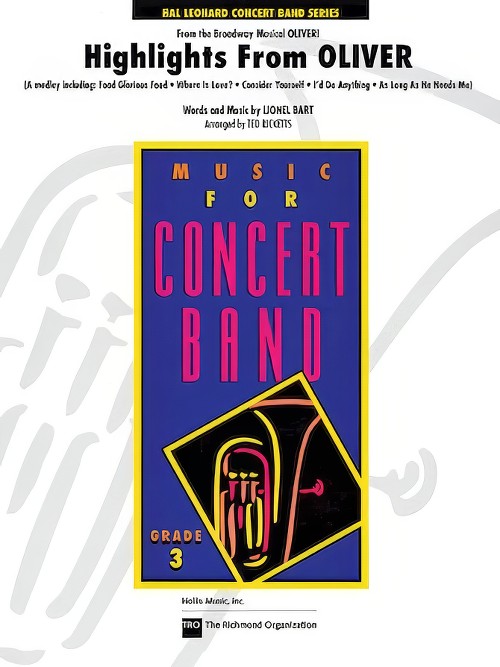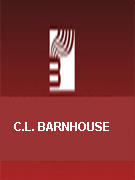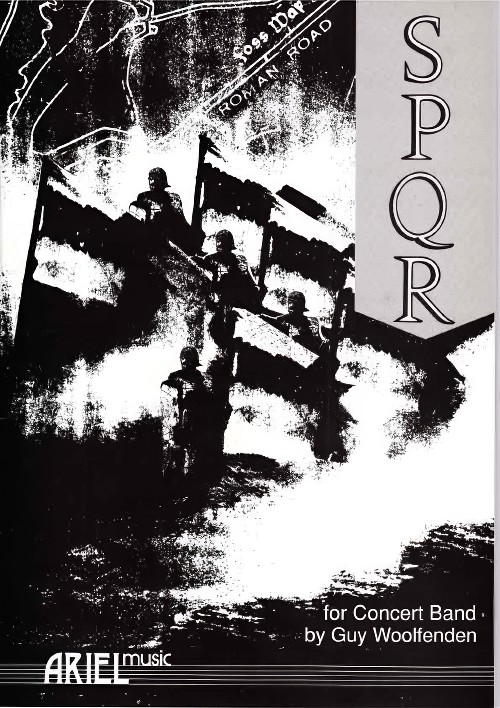Results
-
 £43.56
£43.56October Sky (Concert Band - Score and Parts)
An impressive lyrical selection for beginning band, "October Sky" has sophistication and musicality uncommon at this grade level. A beautiful and memorable melody is presented amid varied textures with wonderful sensitivity. The melody develops into a glorious full ensemble and then to a climax invoking images of a breathtaking fall sunset. It then subsides, ending with a heartwarming, soft touch creating a spell to be long remembered. An outstanding lyrical selection!
Estimated dispatch 7-14 working days
-
 £64.99
£64.99OLIVER (Highlights) (Young Band) - Bart, Lionel - Ricketts, Ted
Featuring some of the most tuneful and memorable melodies from Broadway, here is a sparkling medley from the musical hit Oliver! This well-paced setting for young bands includes: Consider Yourself, Food Glorious Food, As Long As He Needs Me, I'd Do Anything and Where Is Love?
Estimated dispatch 7-14 working days
-
 £76.99
£76.99On My Way (Concert Band - Score and Parts)
The English musician Phil Collins has written six new songs for the animated Walt Disney film Brother Bear. His catchy pop rock is well known and popular with a worldwide audience. In Brother Bear, the young Kenai kills a grizzly bear to avenge his brother's death. Then he is magically transformed into a bear himself and he makes friends with the bear cub Koda. Together, they undertake a long, exciting journey in search of the mountain where Kenai can become human again. Meanwhile Kenai's remaining brother hunts them in order to avenge his family. Thus, the main themes of Brother Bear are brotherhood and friendship. On My Way gives voice to the courage and the determination that characterise Brother Bear. Peter Kleine Schaars has produced an excellent arrangement for band, which reflects the original film music very well. 0:03:45
Estimated dispatch 7-14 working days
-
 £84.99
£84.99On the Movieset Wind Band Set (Score & Parts)
Glitter and glamour, good-looking people, a lot of Bling Bling and fast cars - images like these will cross our minds when we think of the movie world. However, reality proves to be different : as a rule, a tremendous amount of work will have been done on the set before a film is ready to be shown on the big screen. A visit to an actual movie set inspired John Emerson Blackstone to write a composition bearing the same name. He had both seen a number of characteristic attributes and heard the typical phrases used in film making, and he incorporated them into 'On the Movie Set' . In the first part, 'The Clapboard', a 'director's assistant' is supposed to shout "Quiet on the set'" and "Action!", as is done before a real scene is shot. Subsequently, in order to create the right atmosphere, the clacking of a 'Clapboard' should be heard. During a romantic scene we should be transported to another world by means of sweet sounds in the background, so romantic music is of course heard in the next part, 'Love Scene'. At the end of a long working day 'It's a wrap' is called on the set to inform everyone that the filming on that day is completed. Now there is only one more thing left to dream of : an Oscar..... Perf. Note: The use of the right props will add to the performance and appreciation of 'On the Movie Set'. A red carpet and a glamorous reception should give your audience the feeling they are attending a real 'opening night'! 09:30
Estimated dispatch 7-14 working days
-
 £84.99
£84.99Paso Bella Wind Band Set (Score & Parts)
Paso Bella is full of the typical fiery and melodic characteristics of the paso doble. The hot Spanish temperament can be heard from the opening themes in the minor key, as is usual in a paso doble, to the last bars of the trio. The trio is followed by an exuberant closing which will reverberate in the ears of both musicians and audience for a long time. 0:04:30
Estimated dispatch 7-14 working days
-
 £77.95
£77.95PITTSBURGH OVERTURE, A (Progress Concert Band) - Sparke, Philip
Located at the confluence of three rivers, Pittsburgh has for a long time been known as 'River City'. Performance time 5'59" (Recorded on QPRM120D THE SWORD AND THE CROWN, Central Band of the Royal Air Force)
Estimated dispatch 7-14 working days
-
 £39.60
£39.60Remember When? (Concert Band - Score and Parts)
An exceptionally nice traditional march for younger bands by Ken Harris. Sounding as big and full as many more difficult marches, this appealing march is quite accessible and perfect for concert or contest use. The newest in a long line of quality marches for younger players by the composer, "Badge of Honor" is sure to be performed for years to come. HIGHLY RECOMMENDED!
Estimated dispatch 7-14 working days
-
 £67.32
£67.32River of Life
The first in a long line of wonderful band compositions by Steven Reineke. Full of soaring melodies, unique harmonies and exciting rhythms, "River of Life" is a quality composition that has had many quality performances at contests and concerts all over the world.
Estimated dispatch 7-14 working days
-
 £35.64
£35.64Rock-A-Saurus Rex! (Concert Band - Score and Parts)
Ken Harris definitely has a long tradition of writing exceptional marches for younger bands and his latest, "Winning Tradition" is one of his nicest. Tuneful and playable with modest technical requirements, you simply can't go wrong with this quality march. Perfect for contest or concert performances. A Real Winner! Recorded on the CD "King's Mountain Adventure" by The Washington Winds.
Estimated dispatch 7-14 working days
-
 £115.00
£115.00S.P.Q.R. (Concert Band) - Woolfenden, Guy
Includes:I. Fosse WayII. NotturnoIII. Via AppiaS. P. Q. R. was commissioned as part of the Warwickshire County Council centenary celebrations in 1988 and my response was to delve even further back than a mere one hundred years, to encompass the Roman occupation of Britain, which lasted 350 years from AD 43. The standard of the Roman legions often carried the letters S. P. Q. R: Senatus Populusque Romanus - The Senate and People of Rome.Among the lasting monuments to this long occupation is the amazing system of roads, one of which, the Fosse Way, bisects the county of Warwickshire from south-west to north-east. Four of the major areas of modern Warwickshire: Stratford-upon-Avon, Warwick, Rugby, and Nuneaton and Bedworth, lie adjacent to this mighty thoroughfare.S. P. Q. R. attempts to juxtapose and contrast the ancient and indissoluble links between rural and urban Warwickshire and the might of ancient Rome. Thus the river Avon becomes a tributary of the Tiber and the Fosse Way joins the Via Appia: All roads lead to Rome!
Estimated dispatch 7-14 working days
